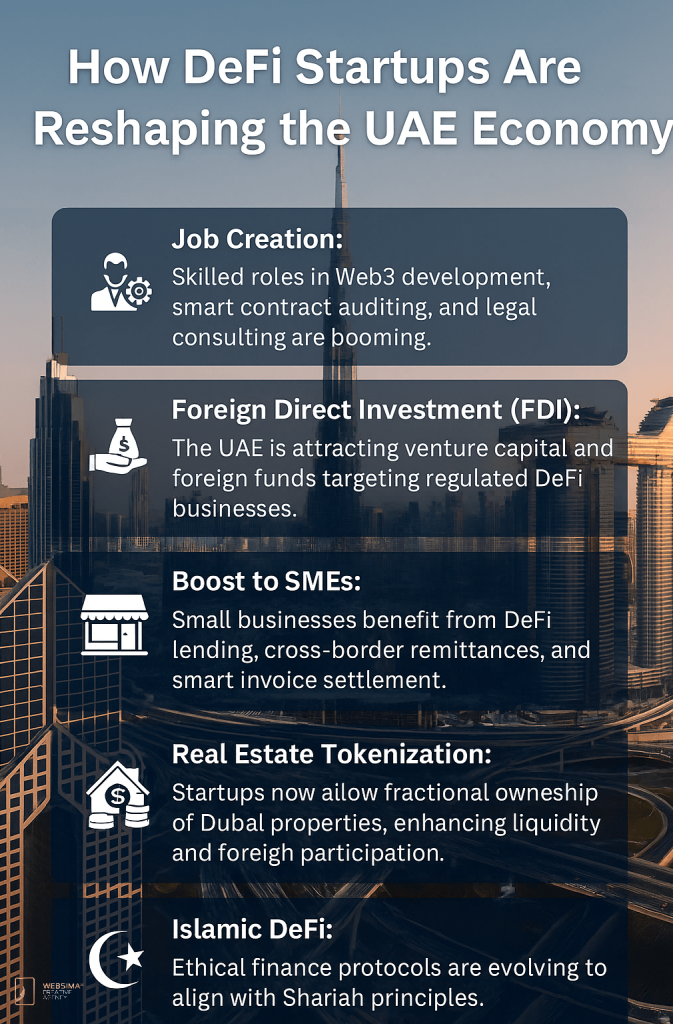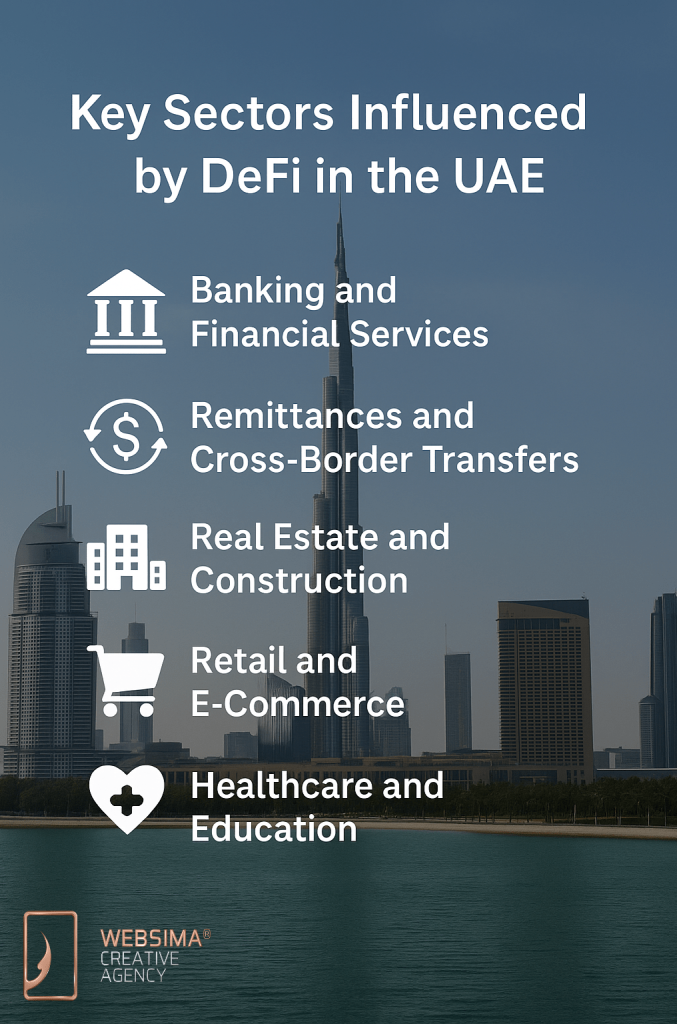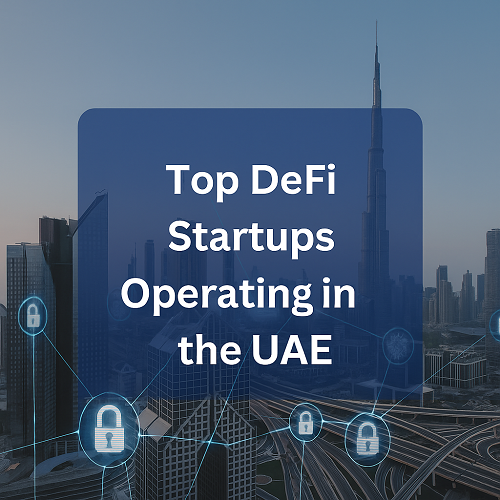Table of Contents
- Introduction
- The Rise of DeFi in the UAE
- Top DeFi Startups in the UAE
- MenaChain
- Fintap
- RAIN
- Matrix Exchange
- ZPAE (ZelaaPayAE)
- How DeFi Startups Are Reshaping the UAE Economy
- Key Sectors Influenced by DeFi in the UAE
- Government Support and Regulatory Landscape
- Challenges Faced by DeFi Startups in UAE
- The Road Ahead: DeFi’s Economic Potential
- Conclusion
- FAQs
- Partner with Websima for Your DeFi Venture
Introduction
The UAE is rapidly becoming a global leader in blockchain innovation and digital finance, driven by its strategic vision, pro-innovation regulation, and digital-first economy. Among the most transformative developments is Decentralized Finance (DeFi)—a blockchain-based alternative to traditional financial systems. As DeFi startups in UAE gain traction, they’re not only building the future of finance but also delivering measurable impacts across the country’s economy. However, ensure to understand the opportunities and risks of DeFi investment in the UAE, before making any investment decision.
In this article, we explore the top DeFi startups based in the UAE and unpack their broader influence on economic growth, financial inclusion, and regulatory modernization.
The Rise of DeFi in the UAE
Ripple Builds on Dubai Regulatory License to Announce Zand Bank and Mamo As First Blockchain-Enabled Payments Clients in the UAE https://t.co/YwWaTbEmxY
— 北尾吉孝 (@yoshitaka_kitao) May 23, 2025
The UAE government supports Web3 innovations and blockchain startups, especially through Dubai’s Virtual Assets Regulatory Authority (VARA) and Abu Dhabi Global Market (ADGM). The government has played a pivotal role in cultivating a fertile environment for DeFi innovation. DeFi services like decentralized exchanges (DEXs), yield farming, lending protocols, and stablecoin infrastructure are increasingly becoming mainstream across MENA.
Key growth drivers include:
- Strong regulatory clarity from VARA and ADGM
- Tax incentives and free zones dedicated to Web3 development
- High crypto adoption among residents and businesses
- Integration with real-world assets (RWAs) like tokenized real estate and commodities
Top DeFi Startups in the UAE
1. MenaChain
Focus: Decentralized payment infrastructure for B2B and B2C in MENA
Overview: Based in Abu Dhabi, MenaChain facilitates real-time crypto transactions across retail and institutional platforms. The startup aims to tokenize regional currencies and build DeFi rails for cross-border settlements.
Impact: Helping local businesses reduce reliance on centralized payment processors and foreign SWIFT transactions.
2. RAIN
Focus: Licensed crypto asset exchange with DeFi integrations
Overview: Bahrain-based but operational in UAE, RAIN bridges traditional finance and DeFi by offering exchange and custodial services with DeFi yield vaults.
Impact: Providing a regulatory-compliant entry point into DeFi for retail and institutional users.
RAIN’s platform is one of the few regional exchanges that complies with the ADGM’s digital asset framework.
3. Matrix Exchange
Focus: Tokenized assets and hybrid CeFi–DeFi solutions
Overview: Regulated by the Financial Services Regulatory Authority (FSRA) in Abu Dhabi, Matrix supports DeFi-like services on a licensed, institutional-grade platform.
Impact: Encouraging foreign institutional investment into UAE’s tokenized financial ecosystem.
4. ZPAE (ZelaaPayAE)
Focus: Crypto payments and stablecoin DeFi applications
Overview: Dubai-based ZPAE is building the UAE’s first decentralized stablecoin pegged to the dirham, along with DeFi tools like staking, automated market making, and micro-finance lending.
Impact: Laying the foundation for local currency-backed DeFi ecosystems in the GCC.
How DeFi Startups Are Reshaping the UAE Economy

DeFi startups in the UAE are not only advancing blockchain innovation but also creating new economic dynamics:
- Job Creation: Skilled roles in Web3 development, smart contract auditing, and legal consulting are booming.
- Foreign Direct Investment (FDI): The UAE is attracting venture capital and foreign funds targeting regulated DeFi businesses.
- Boost to SMEs: Small businesses benefit from DeFi lending, cross-border remittances, and smart invoice settlement.
- Real Estate Tokenization: Startups now allow fractional ownership of Dubai properties, enhancing liquidity and foreign participation.
- Islamic DeFi: Ethical finance protocols are evolving to align with Shariah principles.
Key Sectors Influenced by DeFi in the UAE

1. Banking and Financial Services
Legacy institutions are now integrating DeFi APIs to offer decentralized savings and investment products.
2. Remittances and Cross-Border Transfers
UAE’s large expatriate population benefits from cheaper, faster remittances via decentralized rails like USDC and XDC protocols.
3. Real Estate and Construction
DeFi tools allow instant settlements, escrow-free investments, and KYC-integrated asset tokenization.
4. Retail and E-Commerce
Merchants are using stablecoins and DeFi-powered payment apps to avoid high credit card fees.
5. Healthcare and Education
Pilot projects using smart contracts for conditional payment structures in healthtech and edtech are emerging across Abu Dhabi and Dubai.
Government Support and Regulatory Landscape
The UAE’s regulatory clarity stands out globally:
- VARA (Dubai): First specialized crypto regulator in the world, offering operational licenses for DeFi and Web3 startups.
- ADGM (Abu Dhabi): Provides comprehensive frameworks for virtual assets, including custody, DeFi compliance, and anti-money laundering (AML).
- DMCC Crypto Centre: Located in Jumeirah Lakes Towers (JLT), DMCC hosts over 500 blockchain and DeFi startups with legal and setup assistance.
This government-friendly posture is accelerating DeFi adoption, de-risking startup environments, and attracting talent from Asia, Europe, and North America.
Challenges Faced by DeFi Startups in UAE
Despite the encouraging environment, DeFi startups in UAE face several hurdles:
- Scalability concerns with Ethereum-based solutions due to high gas fees
- AML/KYC compliance balancing decentralization with regulatory reporting
- Lack of DeFi-specific legal precedents for dispute resolution
- Consumer trust issues around hacks, rug pulls, and protocol bugs
- Limited integration with traditional banks, though progress is ongoing
The Road Ahead: DeFi’s Economic Potential
Dubai and Abu Dhabi are positioned to become regional DeFi powerhouses—not just crypto hubs. With continued support from regulators and active participation from startups, the UAE’s DeFi sector could contribute to:
- 5–10% of financial services GDP within the next decade
- Major role in cross-border trade finance, especially among BRICS and Gulf nations
- Leadership in green DeFi, aligning with ESG and sustainability goals of the UAE Vision 2030
According to a McKinsey & Company report, tokenized market capitalization across real-world assets (excluding cryptocurrencies and stablecoins) could reach $2 trillion by 2030, with upside potential toward $4 trillion. These projections illustrate how DeFi infrastructure—including asset tokenization—can unlock massive global value, and the UAE is strategically positioning itself to capture a meaningful share of this emerging market.
Conclusion
DeFi startups in the UAE are reshaping the financial landscape—making it more inclusive, transparent, and accessible. Through visionary policies, deep capital markets, and a crypto-literate population, the country is evolving into a global DeFi and Web3 leader. As more use cases emerge and infrastructure matures, the UAE’s economy is bound to benefit from this decentralized wave of innovation.
Startups like MenaChain, ZPAE, and Matrix are proving that UAE-based DeFi can meet both economic and regulatory expectations, paving the way for scalable, impactful fintech solutions.
FAQs
What is DeFi and why is it important in the UAE?
DeFi, or Decentralized Finance, uses blockchain to provide peer-to-peer financial services. In the UAE, it offers solutions for cross-border payments, financial inclusion, and innovation in regulated environments.
Are DeFi startups regulated in the UAE?
Yes. Dubai’s VARA and Abu Dhabi’s ADGM both offer licensing frameworks for DeFi entities, especially around KYC, custody, and operational compliance.
Can I invest in UAE-based DeFi platforms as a foreigner?
Yes. Most platforms allow global participation, provided KYC requirements are met. UAE free zones also welcome foreign DeFi founders and investors.
What risks should I consider when using DeFi platforms?
Smart contract bugs, market volatility, and protocol failures. Always use audited platforms and review their security disclosures.
How is DeFi different from centralized crypto platforms?
DeFi platforms operate without intermediaries. Users retain full control over assets, typically through smart contracts and decentralized governance.
Partner with Websima for Your DeFi Venture
At Websima, we empower visionary founders, financial institutions, and Web3 startups to bring DeFi solutions to life. From smart contract development and protocol design to DeFi wallet integration, tokenomics consulting, and full-stack dApp architecture—our experts deliver custom-built infrastructure tailored to the UAE’s evolving legal and business landscape.
We also assist with:
- Regulatory readiness for VARA and ADGM licensing
- KYC/AML integration for DeFi platforms
- Smart contract audits and token launches
- Building Web3 UX/UI experiences optimized for mobile and DeFi-native users
Ready to build the next generation of decentralized finance in the UAE?
Contact Websima today and let’s start shaping the DeFi future together.





